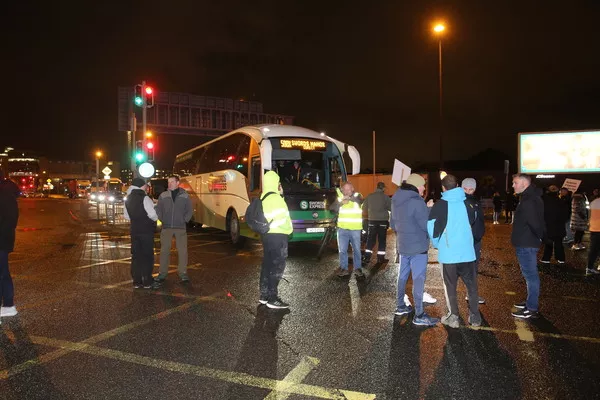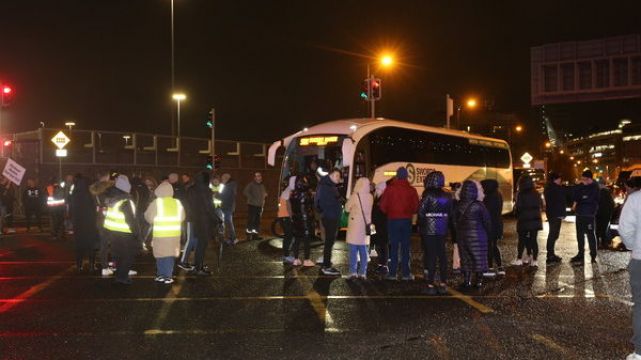More consultation with local communities around issues such as housing and homelessness is required to prevent far-right groups stoking up anger and division, according to the lead researcher of a study on the far-right in Ireland.
Inspired by a concern at the rise of the far-right in Ireland, the STOPFARRIGHT project surveyed opinion among civil society groups affected such as migrants, ethnic and sexual minorities, feminists and anti-far-right groups, and how they can counter this.
Speaking to BreakingNews.ie, Dr Barry Cannon of Maynooth University explained that a lot of the research findings can be identified in how far-right groups have recently sought to protest the housing of refugees in places such as East Wall in Dublin, and Fermoy, Co Cork.
"What research participants said to us when we asked about the threat of the far-right, was the far-right tends to piggyback on issues of social concern, both at a local level and a more general national level.
"In this respect the arrival of people seeking asylum in Ireland, and their housing in different parts of the country by the Government on an emergency basis, is certainly one of the issues the far-right is trying to capitalise on. Homelessness was one of the things people also pointed to as an attempt by the far-right to occupy that space."
The East Wall protests started out due to locals' concerns about a lack of services in the area, with 400 refugees now housed at the old ESB building.
A number of far-right groups have since inserted themselves in these protests, with local TD Gary Gannon going as far as to claim the protests have been "hijacked".
A meeting followed between locals and Minister for Integration Roderic O'Gorman and Minister for Finance Paschal Donohoe, who is a local TD, but it failed to find a solution.
Dr Cannon said a key finding of his research was that a lack of local consultation has led to similar problems in the past.

"People were saying to us there are legitimate concerns there and a core issue is this question of consultation. First, people don't feel they are being consulted locally, and secondly people are worried about services and access to services which are already stretched.
"What the Government is saying at the moment is that it's an emergency situation.
"But this has happened before the current asylum emergency caused by the war in Ukraine when the Government has housed asylum seekers in rural areas and residents have got up in arms as a result, and then you see far-right elements trying to capitalise on that and get political capital out of that and get their narratives across... which are essentially racist.
"Then you end up having community activists and people on the ground who try to counter that, and you can end up with a lot of tension in these areas.
"The key issues are around consultation, this has been a longstanding problem. It's understandable now as there has never been so many people seeking asylum with the war in Ukraine, but it has happened before this, so there's a question there about consultation."
While far-right political parties have not had success in Ireland to date, this can change quickly, and Dr Cannon said this is something which should be monitored closely by political parties and the state.
"In Ireland it's slightly different from other countries in Europe because Sinn Féin has not been in power. It's often argued that a lot of people who would vote for the far-right in other jurisdictions would vote for Sinn Féin here... but Sinn Féin has come out very strongly against anti-asylum seeker rhetoric. They don't speak against asylum seekers.
"Where it could become dangerous is if Sinn Féin does come into power and disappoints people like other parties are seen to have disappointed the electorate... then that would open up a space for the far-right to come in, I would suggest, as people may have nowhere else to turn. This is what happened in France, for example."
Dr Cannon said far-right groups are trying to infiltrate local concerns around the housing of refugees in the same way they did with Covid-19 restrictions.
"They try to get a very specific narrative which suits their political purpose, it's very strategic what they're doing. Basically, it's a narrative that supports hierarchy, they try to put across this idea that they're protecting ordinary people and so on and so forth, but they are not.
"Really all they're interested in is sowing division so that they and their discourse can begin to dominate the public narrative and shift it in a particular way towards being anti-immigrant, racist, in the way you find in some countries to the extent that discourse becomes mainstream.
"What these far-right groups are trying to do is make their discourse mainstream so that then the frame in which we discuss things is their frame. 'Immigration is the problem, people from different cultures are the problem', and so on. I think there's a very specific discourse they're trying to get across, and they want political discourse to be dominated by their ideas, not by more pluralistic ideas."
Counter-protests
The protests in Fermoy were met with a strong counter-protest, where locals of the Cork town made it clear refugees are welcome.
Dr Cannon said this is the case in most Irish towns, and that including locals in decision-making can only help the situation.
"People across the country have shown themselves to stand against this, some of the people we interviewed in our webinars on the ground are out there working against these ideas being spread, and showing Ireland is a welcoming place, I've no doubt this is the case.
"There's an important point there not to let discussion around scarcity of public services and housing be shoehorned into this narrative that it's all the fault of immigration for example.
"One of the things we came across in our research was the need for Government to be seen to be responding to these issues in a fair and equitable manner and to be responsive to people's genuine needs around housing.
"It's not just about fighting the far-right it's also about channelling the idea that people are frustrated about the level of services being provided and people's access to basic rights such as housing and that this is justified.
"It's really important first of all that people feel they're being informed and have some input into the process. I know that's difficult in the current situation.
"The Government's response is ad hoc, but people will continue to come to Ireland seeking asylum and refuge even after the current emergency. A more organised process should be put in place including consultation with local communities about where people can go and access to services.
"It gives people working on the ground who can counteract the far-right a chance, to inoculate these local communities against far-right discourse and anti-immigrant and racist discourse.
"The Government has to think about this in a medium to long term manner, from our research it currently seems to be a very short term approach to it."
The research found a three-pronged approach was needed to counter far-right groups; State, local and individual.
Social media literacy
"Another interesting finding in counter measures against the far-right was on citizenship building. That was about giving citizens themselves the ability to withstand far-right discourse and action. One of the things put across was teaching people in communities media literacy, particularly social media, and how to navigate and confront intolerant attitudes on social media as well.
"Also, the idea of inclusion, so people feel they are part of decision-making processes and not just a passive recipient of decisions made elsewhere.
"Another is a political tradition being developed of greater political participation on the part of local communities, so they can understand what's going on and act against far-right actions in their communities when they take place.
"The narrative has to be changed to stress commonalities rather than differences. It's not migrants coming here causing a housing crisis, there's a housing crisis because of particular policies in that area pursued by successive governments.
"Most people understand that... the problem is if communities feel they aren't being listened to they will turn to people they feel are listening and research in other European countries finds that these far-right organisations are good at inserting themselves into local communities and then becoming the main articulators of community frustration. We need to avoid that here and make sure local voices are included and that they can participate in decision-making."







